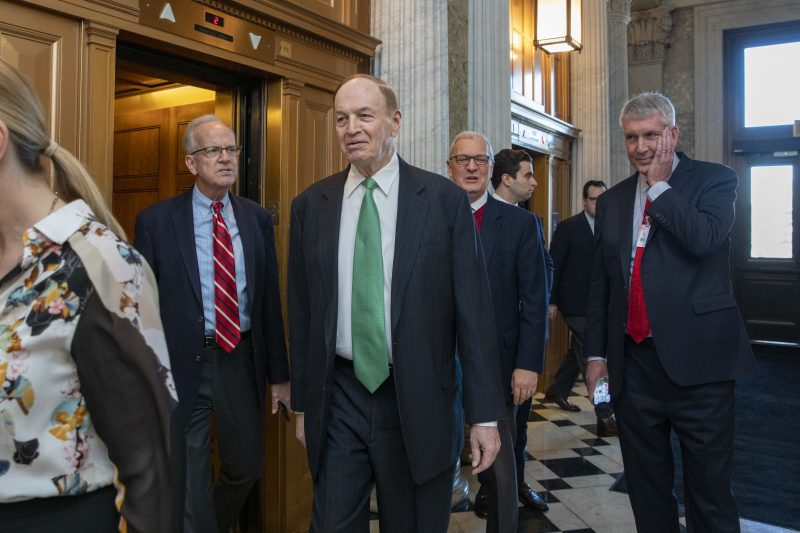In 1992, running as a conservative Democrat not aligned with his party’s presidential nominee, Richard C. Shelby cruised to victory with 65 percent of Alabama’s vote.
By 2016, running as a Republican not supportive of his party’s presidential nominee, Shelby cruised to victory with 64 percent of the vote.
In all the years, the ups and downs of 36 years in the Senate and eight years in the House — 16 as a Democrat, 28 as a Republican — Shelby cut a path as one of the great political survivors of this era.
Not just surviving, often thriving.
He chaired four Senate committees. He clashed with Senate legends, CIA officials, the Justice Department and the ethics committees. He feuded with Bill Clinton and Donald Trump.
Shelby, 88, got the last laugh on Thursday afternoon as he and his longtime friend, Sen. Patrick J. Leahy (D-Vt.), received a standing ovation moments before the duo’s nearly $1.7 trillion bill funding the federal government received wide bipartisan approval. The two leaders of the Appropriations Committee embraced days before they will retire and walk off into the political sunset.
While Leahy was always a Vermont liberal, Shelby has, in his own words, “evolved” over the years. But he always found the political sweet spot and kept winning.
His career is a rebuke to two trends in today’s Senate: those who rush to social media and cable news with outlandish actions seeking attention, and those who sit quietly on the legislative sidelines and do as their party leaders instruct.
“If all you’re interested in is doing everything to please everybody — to say, ‘This is to help me get reelected’ — you’re going to be a House member or a senator of no consequence up here,” Shelby said in a long interview Monday inside his office, where just about everything had been boxed up and sent to storage. “And you’ll be here for the wrong reason.”
Shelby believes his steady popularity back home comes from understanding that voters still value a “senator of consequence,” particularly in the mold of the old-time Southern senator who spent decades acquiring power and using it to help constituents.
Born in Birmingham in 1934, Shelby attended the University of Alabama and the Birmingham School of Law before winning a state Senate seat. He won a House seat in 1978 and entered Congress with a collection of rising stars that included then-Reps. Dick Cheney (R-Wyo.) and Newt Gingrich (R-Ga.)
By 1986, he jumped into an uphill Senate race against an incumbent, Jeremiah Denton, who was a beloved war hero who had spent 7½ years as a prisoner of war in Vietnam.
“A tough race,” Shelby recalled. He won by fewer than 7,000 votes, just 0.6 percent for his margin. And he would never again face a campaign like that one.
He joined another class of future congressional statesmen: Thomas A. Daschle (D-S.D.) and Harry M. Reid (D-Nev.), future majority leaders; John McCain (R-Ariz.), himself a Vietnam hero who won the 2008 presidential nomination; and Barbara A. Mikulski (D-Md.), the longest-serving woman in Senate history.
“We were all ambitious. We knew that,” he recalled, noting that he’s the last person in office from those classes of 1978 and 1986.
Early on he asked the Senate majority leader, Robert C. Byrd (D-W.Va.), for a seat on the Appropriations Committee. “Definite Republican tendencies,” Byrd told senior Democrats, explaining his rejection.
Shelby quickly discovered that the days of Southern conservatives dominating the Democratic caucus had passed, and after he won a second term in 1992, he openly feuded with President Bill Clinton. White House officials retaliated by offering Shelby just one ticket to the ceremony honoring Alabama’s national football championship. Howell Heflin, the state’s Democratic senator, got 15 tickets.
The day after Republicans swept the 1994 midterm elections, Shelby switched parties. He set out to reshape his state’s economy, beginning with Huntsville.
“A few decades ago, it was a sleepy town by the Tennessee border. Today, it’s a booming technological hub for cutting-edge industries like space exploration and missile defense,” Senate Minority Leader Mitch McConnell (R-Ky.) said in a tribute speech to Shelby.
And a trip to Singapore led Shelby to turn Mobile’s port into one of the deepest in the nation. But senators of consequence do more than deliver dollars for their states, and Shelby’s first chairmanship came on the Intelligence Committee.
He counts his vote for the 2002 authorization of the Iraq War among his biggest regrets, blaming CIA officials for misleading Congress about the regime’s arsenal of weapons of mass destruction.
“We were told by our intelligence people and everybody else that that’s what they were doing,” he said, wishing he had listened to his own doubts at the time. “I think that’s one that all of us needed more data.”
Instead he spent two years fending off a Justice Department investigation into allegations that he leaked classified information during a congressional investigation into the 2001 terrorist attacks. No charges were filed, and the Senate Ethics Committee closed the matter without any punishment.
As he recounts his old battles, they often end with the same phrase: “We won that.”
That’s how he described a battle with McCain over a Mobile shipbuilding dispute, and how he and Sen. Richard J. Durbin (D-Ill.) again defeated McCain on a dispute over purchasing Russian rockets for the U.S. aerospace industry, with its focus in Huntsville.
“And we won that,” he said, breaking into a smile. “McCain did congratulate me on that.”
The legendary battles with the Arizonan began, like so much in the Senate, on more personal terms. “I think McCain and Shelby’s split came over John Tower,” he recalled.
The former GOP senator from Texas had been nominated by President George H.W. Bush in 1989 for defense secretary, and Shelby had initially pledged to support McCain’s close friend.
But Sam Nunn (D-Ga.), the Armed Services Committee chairman, disliked Tower and held weeks of hearings, including allegations of personal misconduct. Shelby stayed loyal to his chairman, opposing Tower.
He loved traveling the world, particularly with his wife, Annette Shelby, the first woman granted tenure as a professor at Georgetown University’s business school. Leahy recalled how his wife, Marcelle, and Annette Shelby helped save a tense meeting in Havana with the Cuban president, Raúl Castro.
“I’m a professor at Georgetown and I’ve taught many Cubans,” Annette Shelby told Castro, after Marcelle Leahy had prodded the famous dictator’s brother to talk about great-grandchildren.
“Well, the half-hour meeting became two hours,” Sen. Leahy said Friday.
Shelby maintained a fairly staunch conservative posture for most of his tenure. As the top Republican on the Banking Committee, he walked away from talks in 2008 that would lead to the $700 billion Wall Street rescue.
Almost nothing changed politically, as his reelection came in like clockwork, always between 63 and 68 percent, but then ahead of the 2016 campaign, Shelby heard footsteps.
Several veteran senators had been caught by hard-charging ideologues in GOP primary campaigns, so Shelby got ready, hiring McConnell’s top political advisers to run a modern campaign. Trump’s ascendancy in Alabama complicated matters, bringing out many first-time voters who weren’t natural Shelby supporters.
“I never ran with Donald Trump. No, I didn’t. I ran ahead of him 20 points,” Shelby said. He won his primary with 65 percent of the vote, well ahead of Trump’s 43 percent plurality.
In his final term, Shelby tried to play the role of institutional caretaker. When The Washington Post broke news that, in his 30s, Republican Senate nominee Roy Moore of Alabama had romantically pursued teenage girls, Shelby broke ranks in that 2017 special election.
“He would’ve been the face of the party for the wrong reasons, and the face of Alabama for the wrong reason,” Shelby said Monday.
He announced he would write in a different candidate, and nearly 23,000 Alabamians followed suit.
Moore, who received a late Trump endorsement, lost by fewer than 22,000 votes.
Soon after Shelby announced he would not seek reelection this year, Trump jumped into Alabama politics again, endorsing Rep. Mo Brooks (R), a controversial figure who spoke at the Jan. 6, 2021, rally before the attack on the Capitol.
Shelby gave his support to Katie Britt, his former chief of staff active in state business circles. He funneled $6 million into a super PAC that pummeled Brooks, who often opposed the type of big-spending deals that Shelby used to boost Alabama.
Britt won the primary. In the general election, she received a very Shelby-like endorsement: More than 66 percent of voters backed her.
Britt’s campaign hat hung in Shelby’s office, one of the last things left. He hopes that she follows his path toward being a consequential senator.
“I am, by nature, not against everything. There are a lot of things I’m hard right on, hard right,” Shelby said. “And a lot of things that I think there is tomorrow. The clock ticks forward, we evolve.”



























